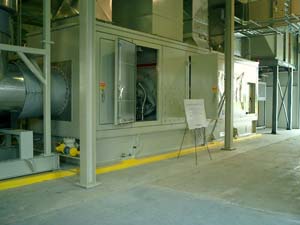Technology, the market and the environment
An interesting thought from Lynne Kiesling at
Knowledge Problem. She is talking about Integrated Gasification Combined Cycle which can take raw coal in, filter out the pollutants (particulates and sulfur) and it outputs a gas which can be used the same as natural gas.
This is a 4.5 Megawatt generation plant recently installed in Austen, TX

It runs off the gas produced by one of these facilities. Overall efficiency is near 80% which is very good for a power plant.
From
their website:
bq. IGCC systems are extremely clean, and are much more efficient than traditional coal-fired systems. IGCC uses a combined cycle format with a gas turbine driven by the combusted syngas from the gasifier, while the exhaust gases are heat exchanged with water/steam to generate superheated steam to drive a steam turbine.
bq. Using IGCC, typically 60-70% of the power comes from the gas turbine with IGCC, compared with about 20% using PFBC. The result is an integrated gasification combined-cycle configuration that provides ultra-low pollution levels and high system efficiencies.
Anyway, Lynne comments on the deployment and economics of this technology:
bq. This technology is important and has a lot of potential to address many potentially conflicting objectives. If you are worried about energy independence and want to reduce U.S. reliance on foreign energy supplies, IGCC can reduce the demand for liquefied natural gas (LNG) imports. If you are worried about high natural gas prices and believe that they will continue at around $6/million BTUs, then IGCC could provide a cost-effective alternative to natural gas. With natural gas prices around $6, even if you have to expend resources to gasify the coal it can be cost effective (if the presentations I saw today are realistic, and I think they are). If you are concerned about the environment, IGCC allows you to use even high-sulfur coal while producing very low emissions. I know of one chemical manufacturer that has been using IGCC for a while because of the combination of these features. Plus, one of the presentations on this session suggested the opportunity to sell 99.9% pure sulfur, which means that firms using IGCC can turn polluting waste into a revenue stream.
bq. Yet the technology is sufficiently new and unproven that few IGCC facilities are being built. This slow adoption is a bit of a conundrum to the panelists I heard today, especially if you think about the possibility of basically bolting on a gasifier to an existing natural gas power plant. With high natural gas prices, the ability this technology gives you to substitute from expensive natural gas to synthetic gas from cheap coal should be very valuable.
Unfortunately, this technology has not taken hold as much as it could be. One person calls this a market failure and Lynne responds with two reasons why it's not:
bq. First, building IGCC plants typically costs more than alternative technologies, so often state PUCs hesitate to allow the costs to be incorporated into the rate base. How is that a market failure? Sounds to me like the application of the prudency standard for evaluating utility costs is the barrier, and is the transaction cost in this case.
bq. Second, this technology is not as mature and proven as alternatives, so investors tend to go with others. How is that a market failure? It sounds to me like the way the world works, and the way the world has always worked. New technologies have always faced implementation hurdles when competing with more mature, known technologies. Why is IGCC relative to, say, pulverized coal technology any different from the steam engine relative to the water wheel in the late 18th century? New technologies compete uphill. Get over it.
She then closes out with these two paragraphs:
bq. It all comes back to customer choice and customer preferences. Itís unfair to them to leave their preferences out of the policy discussion, and out of the determination of the technologies that are used to generate the power that they purchase to fuel their various and diverse uses.
bq. Itís also wrong to call something a market failure when the transaction costs that are preventing a market from behaving the way you think it should are the consequence of either regulatory constraints or risk preferences.
Very good point. Interesting technology, very efficient but expensive capital cost. Something to watch...
Posted by DaveH at November 18, 2004 4:10 PM
